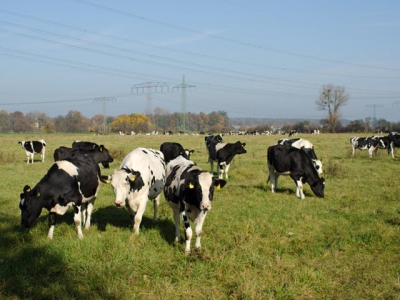Dutch dairy consortium evaluating effectiveness of DSM methane inhibitor

DSM recently announced it is taking the next step towards implementing its methane inhibitor, now branded as Bovaer, in the Netherlands through a trial at the Dairy Campus in Leeuwarden.
The objective is to study the interaction between different diets and dosages of the feed additive on the level of methane reduction.
“We have requested market authorization in Europe for a range of commercial dosages of Bovaer. Most of the trials conducted to date were with the lowest commercial dose. During this specific trial, we will also test a higher range of the commercially available dose levels.
“Additionally, we will use the product with a variety of rations. Combined with previous studies, [this trial data] will give us the predictive insights on methane reduction by various dose/ration combinations,” Mark van Nieuwland, global program head for DSM, told FeedNavigator.
He said such data will enable feed companies to better advise their customers, but that kind of information is also required for inclusion in carbon accounting systems.
Collaborative effort
The design of the trial has been undertaken by a consortium from across the Dutch dairy sector including DSM, Wageningen University and Research (WUR), FrieslandCampina, and feed companies, Agrifirm, De Heus and ForFarmers.
A team of cattle nutrition experts from WUR including Jan Dijkstra, associate professor in ruminant nutrition, Wageningen University, will lead the study.
The major research question is whether Bovaer will have a different level of efficacy depending on the type of diet, Dijkstra told this publication. “We have chosen three different diets based on the maize components of the roughage. The reason for that is that in the Dutch annual nutrient assessment cycle, KringloopWijzer, there are three different values - in terms of methane produced per kilogram of dry matter of feed - and those feed values depend on whether there is zero, 40% or 80% maize silage in the roughage part. Therefore, we want to know whether a particular dosage of Bovaer will be equally effective for those three different levels.”
On average, 50% of the diet of the cow in the Netherlands is fresh grass or grass silage, 25% is maize silage and the final quarter is made up of concentrates, he explained.
“If you can show how much methane is being reduced in a trial, then the chances [are greater] the organization behind the KringloopWijzer will accept Bovaer as an official way to reduce methane.”
The trial will include 64 cows, and the team will correct for any individual cow variation at the start of the experiment, said Dijkstra. The researchers will begin taking real measurements only after an adaptation period for the cows.
The results will be valid for dairy farmers in Belgium, parts of the UK, Germany and Denmark. “The insights will be applicable for any farmers that use a mix of maize and grass silage,” said Dijkstra.
In terms of other Bovaer-related trials that are currently underway or are set to take place in the near future, van Nieuwland said: “At the moment we have five trials ongoing – a large commercial scale beef trial in Alberta, which is co-funded by Emissions Reduction Alberta, a commercial scale dairy trial in Europe, and three trials focused on form and application development in Australia, New Zealand and Europe.”
As well as this upcoming new study led by Wageningen University, he said DSM is in final preparations for further studies in Ireland, the UK, Denmark, Norway, Finland, Spain, Australia and New Zealand, which will likely start some time next year.
“Additional studies might be added in the course of 2020.”
Related news
 Five tips for making high-quality flaked corn for cattle
Five tips for making high-quality flaked corn for cattle Maximizing the surface area of grain to rumen microbes is a critical first step in optimizing performance in cattle.
 Brazil: Low feed prices could expand feedlot cattle production
Brazil: Low feed prices could expand feedlot cattle production Increasing global and domestic demand is expected to boost Brazil’s production of pork and beef, while low and stable feed prices may support the growth of feed
 Sheep farmers now able to breed low-methane animals
Sheep farmers now able to breed low-methane animals In a world first, New Zealand sheep farmers now can breed animals that emit less methane.